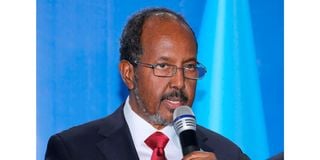After relief, Somalia’s first task is how to avoid debt

President Hassan Sheikh Mohamud of Somalia.
Somalia is celebrating $4.5 billion in debt relief from the International Monetary Fund and the World Bank, allowing Mogadishu to discuss new lending programmes with financial institutions.
But the biggest task for Mogadishu, officials admit, is how to avoid the very debt that has plunged the country into 30 years of turmoil. On Thursday, President Hassan Sheikh Mohamud said the relief would free his administration to seek funding for key projects. But even he said he had a huge responsibility to avoid a borrowing binge.
"We have proved to ourselves and to international partners that we can reform and move away from the detrimental stigma of a failed state to a new reality of hope and possibilities. But despite these clear successes, a key challenge, as for other countries that have benefited from debt relief in the past, is debt sustainability and management in an era of global economic slowdown and recurrent shocks," he said on Thursday, a day after the World Bank and IMF formally granted Somalia debt relief after years of review.
Somalia will still have moderate but sustainable debt levels, he said.
"We plan to avoid a return to the debt trap by using our strategic location, young population and vast natural resources to grow our economy. We are focused on attracting investment in all our key competitive sectors - agriculture, livestock, green energy and the blue economy - to create opportunities and jobs to build socio-economic and climate resilience."
Wednesday's announcement means Somalia has normalised relations with former creditors, allowing the Federal Government to discuss new concessional financing for projects. But it must continue to reform its fiscal system, including transparency and accountability of public funds.
On Friday, the Federation of Somali Trade Unions (FESTU), the umbrella body for labour unions, said debt relief could open up Somalia's economy and improve employment opportunities. But even they said "it is important to recognise that debt relief comes with responsibilities.
"Trade unions strongly believe that expecting Somalia to take on new debt would be unwise and could lead us back to the financial difficulties we have just overcome," FESTU General Secretary Omar Faruk Osman said in a statement.
"It is imperative that we remain vigilant to ensure that the benefits of debt relief are equitably distributed among Somali citizens," he added. FESTU said it supported trade union calls for an improved system of debt relief for poor African countries and others around the world.
The debt relief comes after the IMF said it had completed the sixth review of Somalia's Extended Credit Facility, allowing the country to access up to $9.3 million in Special Drawing Rights. Since 2020, Somalia has received some $388.7 million under this facility.
The World Bank has also approved Somalia's completion point for the Heavily Indebted Poor Countries (HIPC) Initiative, which means Somalia can save up to $4.5 billion in debt repayments. Somalia's budget for 2024 is set to exceed $1 billion as officials seek to raise up to half of the money locally and the rest through foreign financial support.
The IMF says Somalia's reforms are encouraging.
"Fiscal policy is guided by a prudent framework that balances the need for higher development spending with protecting fiscal sustainability and takes into account capacity constraints," said Antoinette Sayeh, Deputy Managing Director and Acting Chair of the IMF's Executive Board.
"The authorities' ongoing efforts to strengthen domestic revenue mobilisation, public financial management, and debt management are commendable. Continued improvements in the institutional capacity of the Central Bank of Somalia are welcome, including in the context of the currency reform. It will also be important to further advance reforms to improve AML/CFT and governance".
Somalia's Ministry of Finance said that in addition to a credible national budget and improved revenue collection, the government will learn to make economic decisions based on data.





